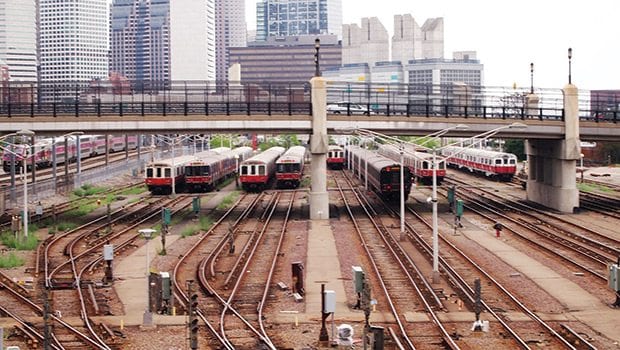Senate holds fares down, approves oversight board for T
Vote on MBTA budget seen as compromise with Baker administration

The Massachusetts Senate’s vote to approve an MBTA control board and nix other measures advanced by Gov. Charlie Baker and House leadership was a mixed blessing for the state’s public transit riders, advocates say.
The budgets advanced by the Baker administration and the House feature cuts to the MBTA operating budget, lift caps on MBTA fares and free the agency from compliance with a state law that some say inhibits privatization of services. The Senate budget maintains funding for the operating budget, keeps caps on fares and preserves the Taxpayer Protection Act.
“It’s actually a good thing that you have so many stakeholders engrossed in a public conversation about transportation and developing a foundation for an MBTA that is an asset to a vibrant economy,” said Joshua Ostroff, outreach director for the advocacy group Transportation for Massachusetts.
The push for MBTA reform comes on the heels of system-wide failures precipitated by crippling winter storms in February and March that exposed longstanding vulnerabilities in the T system — 40-year-old rail cars, the absence of snow-removal equipment and antiquated track switches that were ill-prepared to withstand ice and snow.
“It was a stress test, and we failed,” said state Sen. Linda Dorcena Forry.
In the weeks that followed the system shutdown, MBTA General Manager Beverly Scott resigned and Baker ousted the MBTA’s board. Now, with a fiscal control board to oversee the agency’s finances, Baker is poised to push through reforms.

Author: Photo courtesy Governor’s OfficeGov. Charlie Baker says a proposed fiscal management board will help the MBTA monitor its finances.
“Establishing a focused, dedicated group of experts to diagnose and fix the problems of the MBTA is an important first step toward creating the world-class transit system the Commonwealth deserves and I am pleased the Senate acted on this measure tonight,” Baker said in a press statement.
If past efforts are any indication, the Baker administration could use help with diagnosis of MBTA problems. Last week critics panned a special report released last month by the gubernatorial special review panel, citing numerous flaws.
While the report concluded that the 39 percent of revenue the MBTA collects from fares is low compared to cities including San Francisco (76 percent) and London (90 percent). But as Boston Globe columnist Robin Washington pointed out, the report’s authors compared the entire MBTA system — trains, commuter rail, buses, boats, The Ride — to the subway component of other cities. By including all modes of transit in London, San Francisco and other cities the authors used in their analysis, the ratio of fares to revenue was comparable.
The report also was panned for including vacation time, jury duty, military service and other planned absences in its accounting of the MBTA’s absenteeism rate. Similarly, the report’s contention that $2.2 billion in capital funds allocated to the MBTA have gone unspent failed to mention that the funds were earmarked for specific projects, including the planned expansion of the Green Line through Somerville.
One aspect of the report with which transportation advocates agreed was the $6 billion price tag on maintenance projects and capital expenditures needed to restore the MBTA’s functioning. That number includes replacement of 40-year-old rail cars, as well as updating signaling and other vital components of the system that failed during the winter storms.
“It is going to take billions in investment to deal with the backlog of maintenance and expand the MBTA’s capacity for the future,” says Ostroff, who cautions that the T should plan to expand its capacity to anticipate growth in the region. “Our population is increasing.”
Without a well-functioning public transit system, businesses, schools and the state economy will falter, Ostroff says.
“There is no statewide and regional economy without a well-functioning T that is affordable, reliable, safe and convenient.”
Dorcena Forry echoes calls for MBTA investment, noting that her 1st Suffolk Senate District is heavily public transit dependent, with service from the Red Line, Fairmount Line, Silver Line, numerous bus routes and commuter rail and boat service.
“We all rely on the T,” Dorcena Forry said. “For me, the transportation infrastructure is a big concern. We in the Boston delegation will continue to support investment in the T. I’m hopeful that this is a first step.”


![Banner [Virtual] Art Gallery](https://baystatebanner.com/wp-content/uploads/2024/04/Cagen-Luse_Men-at-store-e1713991226112-150x150.jpg)



